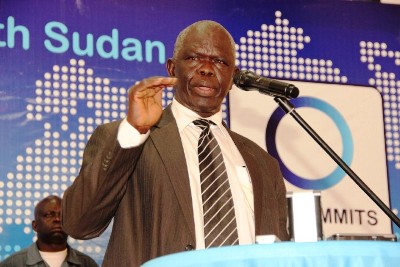S. Sudan silent on $4.5bn loan obtained after oil shutdown
November 22, 2013 (JUBA) – South Sudan’s ministry of finance has declined to explain how it allegedly borrowed $4.5bn from financial lending institutions and foreign governments following last year’s abrupt oil shutdown after a dispute with Sudan.

Finance minister Aggrey Tisa Sabuni has confirmed that the government intends to pay back the loans using oil revenues.
“As I speak the payment of four shipments have not come. They all have gone to those companies we borrowed from. The borrowing to the tune of $4.5 billion must again be paid out of domestic collections, non-oil revenues as well as oil revenues”, Sabuni said in a statement broadcast by the state-owned SSTV on Thursday.
He did not, however, explain how the money the government is currently paying back at the expense of delaying paying its employees was used.
Till now, it remains unclear as to why the government entered such extensive borrowing from financial institutions when it had claimed previously that it held reserves, which would last several years even if oil production remained shut down.
“Business people and financial lending institutions take advantage of the situation the country underwent. I knew the potential would be disastrous because we would see interest rates spike across the board. We would see huge crash in the hard currencies like dollar, but there is no alternative”, Sabuni said.
“People counted on the financial lending institutions and getting it back, is now affecting the regular payment of the employees and other development projects”, added the minister.
Some officials at the ministry of finance, meanwhile, claim they did not know that such a huge amount of money was borrowed from different financial institutions during the oil shutdown.
“It is astonishing development for me. I did not have prior knowledge even though I am in the directorate where such activities would have been known. I only came to learn about it during the annual budget presentation. But I knew the government was borrowing anyway”, a senior finance official who preferred anonymity told Sudan Tribune on Friday.
He said he knew the consequences of the loan were avoidable.
The consequences, another source added, are so severe that even as the country enters the end of the year, it is still not able to ultimately pay employees regularly and to lift the government’s borrowing.
COUNCIL OF MINISTERS DIRECTIVE
On Friday, however, a council of ministers’ meeting chaired by president Salva Kiir directed the finance ministry to pay all salaries of civil servants before Christmas.
The directive, information minister Michael Makuei said, came moments after the finance minister had briefed his counterparts on the revenues it obtained from oil, which had been planned to service external debts.
(ST)
